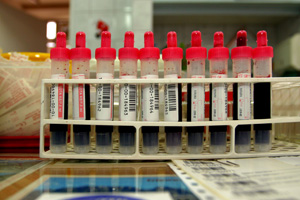Researchers Debunk Classic Myths of Condition Often Seen in Critical Patients

Researchers have discovered that certain markers in a patient's blood do not necessarily mean they will develop RAI.
A study by researchers at the Paul L. Foster School of Medicine proves certain diagnostic markers do not predict relative adrenal insufficiency (RAI) in critically ill or injured patients.
RAI is a potentially life-threatening syndrome that results from inadequate basal or stress levels of plasma control, according to the U.S. National Library of Medicine. RAI is often under recognized and under diagnosed because current diagnostic tests are not sensitive enough to detect it.
Traditional teaching describes an association of hyponatremia (deficiency of sodium in body fluids), hyperkalemia (high levels of potassium in the blood), hypercalcemia (too much calcium in the blood), hypoglycemia (low blood sugar) and eosinophilia (high level of white blood cells) in patients with RAI.
“Relative Adrenal Insufficiency and the Critical Care Setting: Debunking the Classic Myth,” a research study conducted in the medical and surgical intensive care units of University Medical Center of El Paso, and led by Fatuma Kromah, M.D., contradicts the aforementioned theory. In fact, Kromah and his research team found that many patients with RAI who participated in the study had opposite results.
Kromah and his team also concluded that in the critical care setting, classic laboratory tests are of minimal value in predicting patients who may have RAI. Physicians treating patients with severe stress should instead obtain a random serum cortisol level to test for RAI.
“This study is a good example of opportunistic clinical research from colleagues making the extra effort while fully engaged in the setting of a very busy clinical environment,” said Richard McCallum, M.D., professor and chairman of the Department of Internal Medicine.
Researchers who assisted with the study include Alan Tyroch, M.D., and Susan McLean, M.D., in the Department of Surgery; Harold Hughes, M.D., and Nina Flavin, M.D., in the Department of Internal Medicine; and Soyoung Lee, MCIS, MCTS, an analyst in the Division of Biostatistics and Epidemiology.
Results of the study were recently published in the World Journal of Surgery.
Related Stories
Celebrating Veterans: TTUHSC’s General Martin Clay’s Legacy of Service and Leadership
From his initial enlistment in the Army National Guard 36 years ago to his leadership in military and civilian health care management roles, Major General Martin Clay’s career has been shaped by adaptability, mission focus and service to others.
Texas Tech University Health Sciences Center School of Nursing Named Best Accelerated Bachelor of Science in Nursing Program in Texas
The TTUHSC School of Nursing Accelerated Bachelor of Science in Nursing (BSN) program has been ranked the No. 1 accelerated nursing program in Texas by RegisteredNursing.org.
TTUHSC Names New Regional Dean for the School of Nursing
Louise Rice, DNP, RN, has been named regional dean of the TTUHSC School of Nursing on the Amarillo campus.
Recent Stories
National Academy of Inventors Names TTUHSC Faculty Senior Members
The National Academy of Inventors (NAI) has designated two current and one former TTUHSC faculty researchers as Senior Members.
The John Wayne Cancer Foundation Surgical Oncology Fellowship Program at Texas Tech University Health Sciences Center Announced
TTUHSC is collaborating with the John Wayne Cancer Foundation and has established the Big Cure Endowment, which supports the university’s efforts to reduce cancer incidence and increase survivability of people in rural and underserved areas.
TTUHSC Receives $1 Million Gift from Amarillo National Bank to Expand and Enhance Pediatric Care in the Panhandle
TTUHSC School of Medicine leaders accepted a $1 million philanthropic gift from Amarillo National Bank on Tuesday (Feb. 10), marking a transformational investment in pediatric care for the Texas Panhandle.
